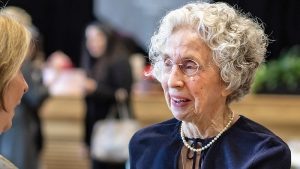
Judge Mary Louise Klas ’60
Mary Louise Klas ’60, a trailblazing judge in Minnesota who worked tirelessly to improve the way the judicial system treated victims of domestic violence, died on Friday, just days after turning 93.
Klas was also the matriarch of a family with deep connections to Mitchell Hamline. She met her husband, Daniel ’60, at law school. Her daughter Barbara ’91 and nephew Bob ’79 are also alums. The Klas family established a scholarship at Mitchell Hamline in 2014.
“She was such a strong character that it is hard to imagine the world without her,” said retired Minnesota Supreme Court Justice Esther Tomljanovich ’55. “I am a richer person for having been able to call her my friend for over 60 years.”
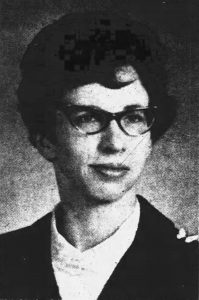
Mary Louise Klas ’60, in a 1973 newspaper article
Klas came to the law during a glass-shattering era for women. She also perhaps unwittingly inspired others. In the early 1960’s, a few years after Klas had graduated law school, a young Rosalie Wahl happened to be seated next to Klas at an event. At the time, Wahl was considering her own future. “Here was this young woman who had a number of children, and she was a lawyer, and her husband was a lawyer,” said Wahl, in a 1994 oral history.
“I looked at her and I thought, ‘geez, if she could do it, maybe I could do it, too.’” Wahl later graduated from William Mitchell College of Law; helped found the school’s clinical education program; and became in 1977 the first woman on the Minnesota Supreme Court. When Klas was appointed a judge in 1986, she was the first woman to sit on the bench in Ramsey County.
Klas often embraced the label of an activist—even crusading—judge on the issue of domestic violence. She never shied from speaking her mind on how to improve systems. That focus was inspired by two events, according to a 2000 article in the Minneapolis Star Tribune: Klas’ appointment to a Minnesota Supreme Court committee looking into gender fairness in the courts, and an assignment where she reviewed hundreds of cases of people seeking protection orders against abusive partners. “We found that we had wonderful laws,” Klas told the newspaper. “But the police weren’t arresting [abusive partners], the prosecutors weren’t prosecuting them and the judges were not holding perpetrators accountable.”
Make a gift in support of the Klas family scholarship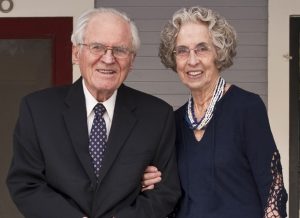
Mary Louise and Daniel Klas in a 2017 photograph
Born on June 5, 1930, Marion Louise May graduated from the College of St. Catherine in 1952, then spent several years as an executive assistant to Governor Orville Freeman before enrolling in St. Paul College of Law in 1956. That’s where she met Daniel Klas, an Army veteran and former schoolteacher who had built a business with his brothers.
“Tall, good-looking, and smart” were Dan’s recollections of first meeting Mary Louise, as noted in his 2017 obituary. Once they got to know each other, Mary Louise invited Dan to play bridge. In turn, he asked her out to a movie. They were married four months later, in 1958, and graduated together in 1960. The school was by then known as William Mitchell College of Law after a combination with another school.
Mary Louise, one of three women in her class, gave birth to her first of five children before graduating with honors and her second after passing the bar. After law school, she practiced part-time while Dan worked for the St. Paul city attorney.
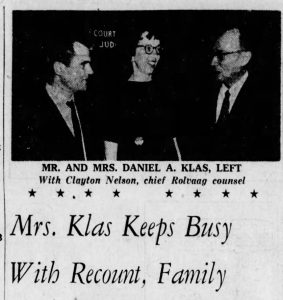
Article from Mar. 8, 1963, in the Minneapolis Star on Mary Louise Klas’s work on the Rolvaag recount legal team.
In 1963, a few months after losing an electoral bid for Ramsey County court commissioner, Klas was named to Karl Rolvaag’s legal team for a trial during an unprecedented political recount. Rolvaag, a Democrat who had been lieutenant governor, ran against sitting Governor Elmer Anderson in 1962. Anderson led the initial count by fewer than 150 votes, but the trial litigated several thousand challenged ballots. Klas was part of a three-person team that eventually helped Rolvaag emerge with a 91-vote lead. It remains the closest governor’s election in Minnesota history.
During the one-month trial, Klas was pregnant with her fourth child and recalled lawyers for both candidates sneaking her soda crackers to nibble during bouts of sickness during proceedings. Once declared winner, Rolvaag named Klas to organize his office and staff.
The following year she was appointed to the state’s Youth Conservation Commission, where she reviewed files and interviewed youths at juvenile and adult correctional institutions.
Klas later learned that Rolvaag considered naming her a municipal judge during his governorship but was dissuaded by several prominent male lawyers who thought her husband might have a hard time coping with having a wife who outranked him professionally.
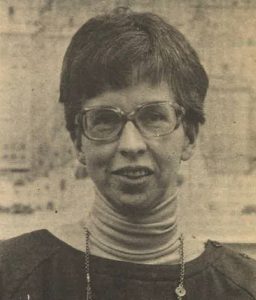
Mary Louise Klas ’60, as photographed for a 1979 article in the Opinion, the student newspaper of William Mitchell College of Law.
Klas told the Star Tribune in 2015 that she cried when she heard that story. “It blew me away,” she said. Dan Klas also never knew that had happened, adding he would have supported his wife, regardless of the old boys’ club that “didn’t want to open judgeships to women.”
The pair opened a husband-and-wife firm in 1973, where Mary Louise specialized in family law. “It’s worked out fairly well,” said Klas in a 1979 article in the William Mitchell student newspaper, The Opinion. “We each have our own areas of expertise. We’d been married 15 years when we set up the joint office so there were no apprehensions [about conflicts].”
Klas was appointed a part-time referee in juvenile court in 1976. A decade later, when she was appointed a Ramsey County judge, she was named to the family court division. “I think it’s fair to say that when she was named to the district court, she came with an agenda,” said Tomljanovich. “In her family law practice, she had seen the damage done by domestic abuse and by the cavalier manner those cases were handled by police, prosecutors, and judges.”
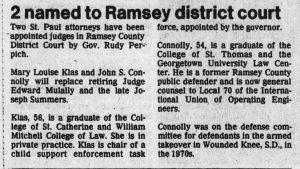
Minneapolis Star Tribune article from Sep. 26, 1986, noting Klas’s appointment to the bench.
Klas faced pushback and criticism but change slowly began.
“Judge Klas worked tirelessly to make the legal system more responsive to the needs of survivors of domestic violence,” said professor emerita Nancy Ver Steegh, who also worked extensively on domestic violence issues during her time at Mitchell Hamline. “She was an effective advocate for change and her courage and commitment inspired others to follow her example.”
Klas was also involved in other areas of the law, serving on more than 20 judicial, professional, and government organizations and committees during her life, as well as an additional 20-plus civic and community boards, including the board of trustees of her undergraduate alma mater, the College of St. Catherine (now St. Catherine University).
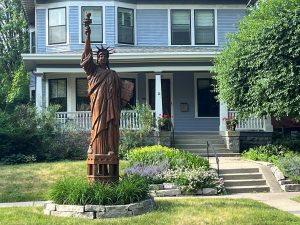
A wood-carved Statue of Liberty stands in front of the Klas house in St. Paul.
At Mitchell Hamline, she served on the alumni board, as an adjunct professor in family law, and in a variety of alumni relations, fundraising, and advisory roles.
“Judge Klas was a force,” said Allison Burke ’09, Mitchell Hamline’s director of development and alumni relations, who befriended Klas while serving on a committee with her. “One of the things I admire most about her is that she was firmly on her own side, and her example encouraged that in the people around her.”
When Dan Klas died in 2017, the couple had been married 58 years and lived most of their lives together in a house in St. Paul that became known in the neighborhood for a Statue of Liberty replica carved—at Klas’s behest—from a dead tree in their front yard.
“Growing up, my mother always said, ‘When you see something that needs to be done, do it,’’ said Mary Ellen Klas Kennedy, her oldest daughter. “Mom spent a lifetime seeing what was to be done and doing it. Her approach taught and inspired.
“We are proud of her legacy, and grateful for her example.”
Further reading
Judge Klas championed rights long after leaving bench (Minnesota Lawyer)
Obituary: Retired Ramsey County jurist Mary Louise Klas, 93, was longtime women’s rights advocate (St. Paul Pioneer Press)
St. Catherine University remembers Mary Louise Klas ’52, JD, trustee emerita (St. Catherine University)
Obituary (Minneapolis Star Tribune)
Klas family connections run deep at Mitchell Hamline (Mitchell Hamline)
Judge Klas appeared on the TPT program Portrait in May 1991. Here’s a clip where she discusses the slow pace of change around domestic violence cases.
